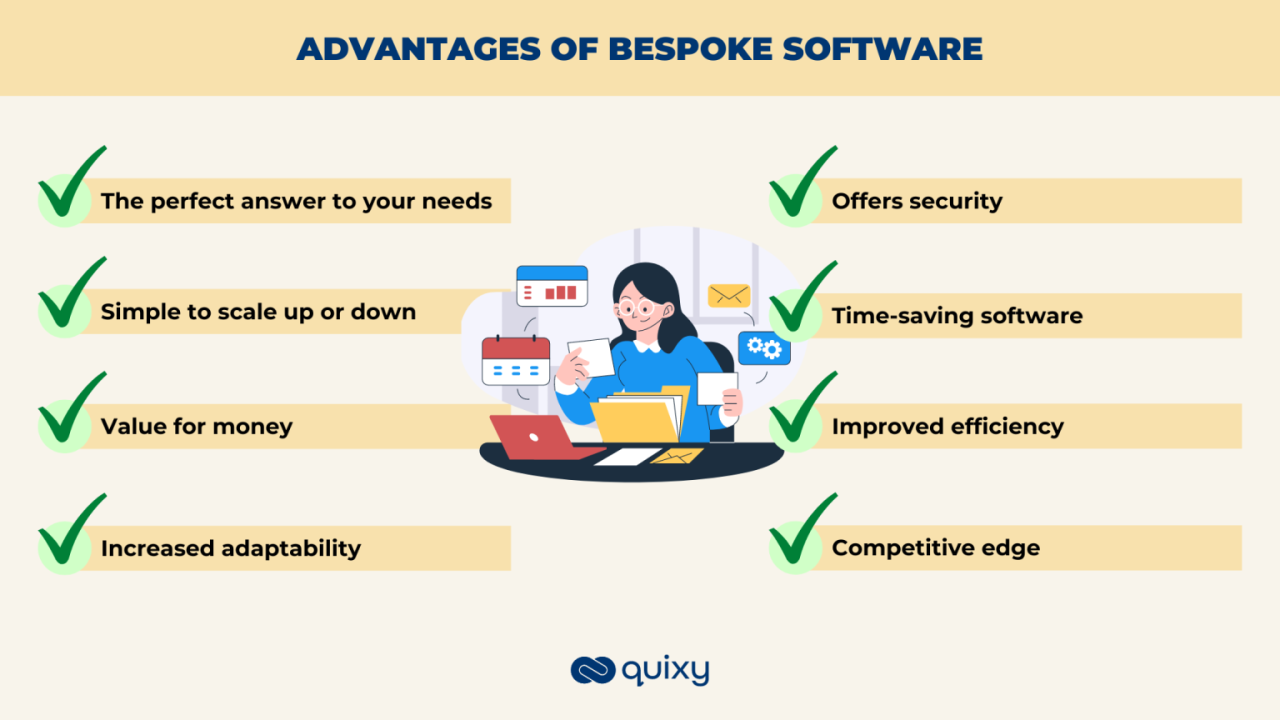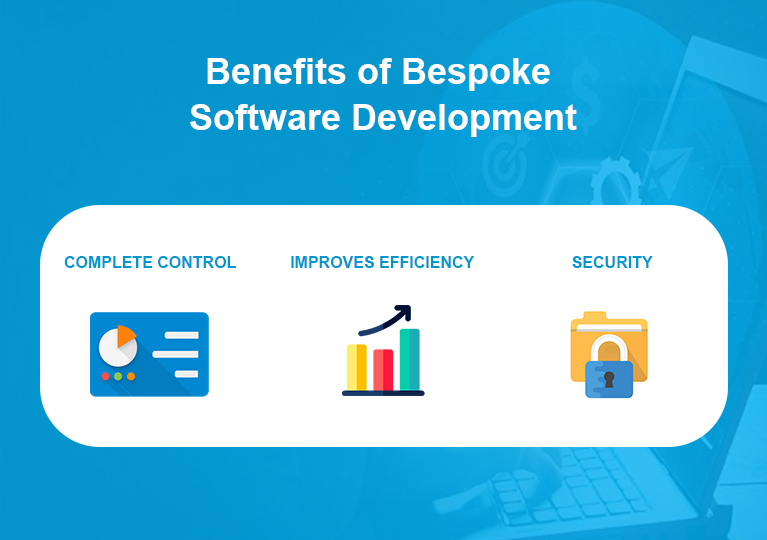Bespoke Technology: Tailored Solutions for Business Success
Bespoke technology, a term that evokes images of highly customized solutions, offers a unique approach to addressing business challenges. Unlike off-the-shelf software, bespoke technology is meticulously crafted to meet specific […]

Bespoke technology, a term that evokes images of highly customized solutions, offers a unique approach to addressing business challenges. Unlike off-the-shelf software, bespoke technology is meticulously crafted to meet specific needs, aligning perfectly with the unique workflows and goals of an organization. This personalized approach allows businesses to gain a competitive edge, enhance efficiency, and unlock untapped potential.
From streamlining complex processes to developing innovative features, bespoke technology empowers businesses to achieve a level of optimization that is simply not possible with generic solutions. This adaptability extends across diverse industries, where bespoke solutions have proven to be instrumental in driving growth and achieving strategic objectives.
Defining Bespoke Technology

Bespoke technology, also known as custom software development, refers to the process of creating software or hardware solutions tailored to the specific needs of a particular client or organization. Unlike off-the-shelf solutions, bespoke technology is not a one-size-fits-all approach but rather a customized solution designed to address unique requirements and challenges.
Comparison with Off-the-Shelf Solutions
Bespoke technology stands out from off-the-shelf solutions due to its highly customized nature. Off-the-shelf solutions, also known as packaged software, are pre-built applications that are designed to meet the needs of a wide range of users. While they offer convenience and affordability, they often lack the flexibility and specific features that a bespoke solution can provide.
- Customization: Bespoke technology offers unparalleled customization, allowing businesses to integrate specific functionalities and workflows tailored to their unique processes and requirements. Off-the-shelf solutions, on the other hand, offer limited customization options, often requiring users to adapt their processes to fit the software.
- Integration: Bespoke solutions are designed to seamlessly integrate with existing systems and data sources, ensuring a smooth workflow and eliminating data silos. Off-the-shelf solutions may require complex integrations, potentially leading to compatibility issues and data inconsistencies.
- Scalability: Bespoke technology can be easily scaled to accommodate future growth and changing business needs. Off-the-shelf solutions may require upgrades or replacements as the business expands, potentially leading to significant costs and disruptions.
- Security: Bespoke solutions offer enhanced security features tailored to the specific vulnerabilities and risks of the client’s environment. Off-the-shelf solutions may have generic security measures that may not be sufficient for all businesses.
Industries Where Bespoke Technology is Commonly Used
Bespoke technology finds widespread application in various industries, particularly those with complex and unique requirements.
- Financial Services: Banks and other financial institutions rely on bespoke technology for core banking systems, risk management, and regulatory compliance.
- Healthcare: Hospitals and clinics utilize bespoke solutions for electronic health records (EHR), patient management systems, and medical imaging analysis.
- Manufacturing: Manufacturing companies use bespoke technology for production planning, inventory management, and quality control.
- E-commerce: Online retailers leverage bespoke solutions for personalized shopping experiences, fraud detection, and order management.
- Education: Educational institutions utilize bespoke technology for learning management systems, student information systems, and online course delivery.
Benefits of Bespoke Technology
Bespoke technology, also known as custom software development, offers a unique set of advantages that can significantly impact a business’s success. By tailoring software solutions to specific needs and requirements, bespoke technology can provide a competitive edge and unlock a range of benefits.
Enhanced Efficiency and Productivity
Bespoke technology is designed to streamline processes and automate tasks, leading to increased efficiency and productivity. By eliminating redundancies and automating repetitive tasks, businesses can free up valuable time and resources to focus on strategic initiatives. For example, a bespoke inventory management system can automate order processing, stock tracking, and replenishment, reducing manual errors and improving overall efficiency.
- Streamlined workflows: Bespoke technology can be designed to seamlessly integrate with existing systems and workflows, minimizing the need for manual data entry and reducing the risk of errors. This streamlined approach improves overall efficiency and reduces bottlenecks.
- Automated tasks: Repetitive tasks, such as data entry, report generation, and scheduling, can be automated using bespoke technology. This frees up employees to focus on more strategic and value-adding activities.
- Improved data accuracy: Bespoke systems can be designed to ensure data integrity and accuracy. By eliminating manual data entry and incorporating automated data validation, businesses can minimize errors and ensure that decisions are based on reliable information.
Addressing Unique Business Challenges
Bespoke technology allows businesses to address specific challenges and capitalize on unique opportunities. Unlike off-the-shelf solutions that may not fully meet a company’s needs, bespoke software can be customized to address specific pain points and enhance existing processes.
“Bespoke technology is like a tailor-made suit; it fits perfectly and addresses all your specific requirements, unlike a ready-made suit that might not be the right fit.”
- Industry-specific solutions: Bespoke technology can be tailored to meet the unique needs of specific industries, such as healthcare, finance, or manufacturing. For example, a bespoke healthcare system can be designed to manage patient records, schedule appointments, and process billing efficiently.
- Competitive advantage: By developing custom software solutions, businesses can gain a competitive advantage by offering unique features and functionalities that their competitors lack. This can attract new customers and differentiate the business in the marketplace.
- Scalability and flexibility: Bespoke technology can be easily scaled and adapted as business needs evolve. This flexibility ensures that the software remains relevant and effective over time, avoiding the need for costly upgrades or replacements.
The Bespoke Technology Development Process
Building bespoke technology solutions requires a structured and collaborative approach. The development process involves a series of steps, each with its own considerations and best practices, ensuring the final product meets your specific needs.
Defining Requirements and Scope, Bespoke technology
The first step is to define the specific requirements and scope of the bespoke technology solution. This involves a detailed analysis of your business needs, existing systems, and potential challenges. Clear communication and documentation are crucial to ensure all stakeholders are aligned on the project’s goals and objectives.
- Conduct thorough research and analysis to understand your business needs and objectives.
- Identify existing systems and infrastructure, including potential limitations or integration challenges.
- Develop a detailed functional specification outlining the desired features, functionalities, and performance requirements.
- Establish clear project timelines, milestones, and budget constraints.
Design and Development
The design and development phase involves translating the defined requirements into a functional and robust technology solution. This phase includes system architecture design, software development, testing, and deployment.
- Select appropriate technologies and frameworks based on the project’s requirements and constraints.
- Develop a detailed system architecture diagram outlining the components, relationships, and data flows.
- Employ agile development methodologies to facilitate iterative development, continuous feedback, and flexibility.
- Implement rigorous testing procedures to ensure the solution meets quality standards and performance expectations.
Collaboration with Technology Providers
Successful bespoke technology development relies heavily on effective collaboration with technology providers.
- Choose technology providers with a proven track record and expertise in the relevant technologies and industries.
- Establish clear communication channels and regular meetings to facilitate information sharing and feedback.
- Define roles and responsibilities for all stakeholders, including project managers, developers, and quality assurance teams.
- Utilize collaborative tools and platforms to streamline communication, document sharing, and project management.
Deployment and Maintenance
Once the solution is developed and tested, it needs to be deployed into your existing infrastructure.
- Develop a comprehensive deployment plan, including data migration, user training, and system monitoring.
- Ensure the solution is integrated seamlessly with existing systems and processes.
- Provide ongoing support and maintenance to address any issues, updates, or enhancements.
- Establish a process for monitoring system performance, identifying potential issues, and implementing necessary adjustments.
Types of Bespoke Technology
Bespoke technology encompasses a wide range of solutions tailored to specific needs and challenges. It involves creating custom software, hardware, or systems designed to address unique requirements that off-the-shelf solutions cannot meet. This section explores various types of bespoke technology, providing insights into their descriptions, applications, and advantages.
Types of Bespoke Technology
| Type of Bespoke Technology | Description | Applications | Advantages |
|---|---|---|---|
| Custom Software Development | Involves creating software applications tailored to specific business processes, workflows, or user requirements. | CRM systems, ERP systems, e-commerce platforms, mobile apps, data analytics tools, and automation software. | Improved efficiency, enhanced user experience, increased productivity, and integration with existing systems. |
| Hardware Customization | Modifying or creating hardware components to meet specific performance, size, or functionality requirements. | Robotics, medical devices, industrial automation, specialized computing systems, and data storage solutions. | Optimized performance, enhanced reliability, and tailored functionality for specific tasks. |
| Embedded Systems Development | Designing and developing software and hardware systems integrated into other devices or products. | Smart appliances, automotive systems, medical devices, industrial equipment, and consumer electronics. | Increased efficiency, enhanced functionality, and improved user experience. |
| Internet of Things (IoT) Solutions | Developing connected devices and systems that collect, analyze, and share data to optimize processes and improve decision-making. | Smart homes, smart cities, industrial automation, supply chain management, and healthcare monitoring. | Real-time data insights, enhanced efficiency, improved safety, and increased automation. |
| Artificial Intelligence (AI) and Machine Learning (ML) Solutions | Developing AI-powered systems that learn from data, make predictions, and automate tasks. | Fraud detection, predictive maintenance, customer service chatbots, image recognition, and personalized recommendations. | Improved accuracy, enhanced decision-making, increased automation, and personalized experiences. |
Real-World Applications of Bespoke Technology

Bespoke technology, with its tailored solutions and unique capabilities, finds applications across diverse industries, driving innovation and boosting business efficiency. Let’s delve into some real-world examples of how bespoke technology is transforming businesses.
Real-World Applications of Bespoke Technology
The impact of bespoke technology is evident across various industries, with tailored solutions addressing specific challenges and unlocking new opportunities. To illustrate this, we can examine some specific applications:
| Industry | Specific Application | Bespoke Technology Solution | Impact on Business |
|---|---|---|---|
| Financial Services | Fraud Detection and Prevention | Machine learning algorithms trained on historical data to identify and flag suspicious transactions in real-time. | Reduced financial losses, improved customer trust, and streamlined risk management. |
| Healthcare | Personalized Treatment Plans | AI-powered systems analyzing patient data to recommend personalized treatment plans and predict potential health risks. | Enhanced patient outcomes, reduced healthcare costs, and improved patient satisfaction. |
| Manufacturing | Predictive Maintenance | IoT sensors and data analytics to predict equipment failures and schedule maintenance proactively, minimizing downtime. | Increased production efficiency, reduced maintenance costs, and improved operational reliability. |
| E-commerce | Personalized Product Recommendations | AI-powered recommendation engines analyzing customer browsing and purchase history to suggest relevant products. | Increased sales conversion rates, improved customer engagement, and enhanced customer experience. |
Examples of Companies Implementing Bespoke Technology
Several companies have successfully implemented bespoke technology to gain a competitive advantage. Here are a few notable examples:
* Netflix: The streaming giant leverages a sophisticated recommendation engine powered by machine learning algorithms to personalize content suggestions for its users, driving user engagement and satisfaction.
* Amazon: Amazon utilizes bespoke technology for its logistics and fulfillment operations, including AI-powered warehouse robots and predictive analytics for optimized inventory management, ensuring efficient delivery and customer satisfaction.
* Google: Google’s search engine relies on bespoke algorithms and machine learning models to deliver relevant search results, making it a dominant force in the search industry.
These are just a few examples of how bespoke technology is transforming businesses across different industries. By leveraging the power of tailored solutions, organizations can unlock new possibilities, optimize processes, and gain a competitive edge in today’s dynamic business landscape.
The Future of Bespoke Technology

The landscape of bespoke technology is constantly evolving, driven by advancements in software development, artificial intelligence (AI), and cloud computing. These emerging trends are poised to reshape the way businesses approach bespoke solutions, offering unprecedented levels of customization and efficiency.
The Impact of AI and Machine Learning
The integration of AI and machine learning (ML) into bespoke technology is revolutionizing the development process and the capabilities of bespoke solutions. AI-powered tools are being used to automate repetitive tasks, analyze vast datasets, and generate code, leading to faster development cycles and more sophisticated solutions.
- Automated Code Generation: AI-powered tools can analyze requirements and automatically generate code, reducing development time and minimizing errors. This allows developers to focus on more complex aspects of the solution.
- Intelligent Automation: AI can automate tasks like data entry, process optimization, and customer service, freeing up human resources for more strategic activities. Bespoke solutions can leverage AI to streamline workflows and improve operational efficiency.
- Predictive Analytics: AI and ML algorithms can analyze historical data and predict future trends, enabling businesses to make data-driven decisions and optimize their operations. Bespoke solutions can incorporate predictive analytics to gain valuable insights and improve forecasting accuracy.
Final Summary: Bespoke Technology
The future of bespoke technology is bright, fueled by the rapid advancements in artificial intelligence and machine learning. These technologies are poised to further enhance the customization and sophistication of bespoke solutions, enabling businesses to leverage data-driven insights and automate complex tasks. As industries continue to evolve and embrace digital transformation, bespoke technology will play an increasingly pivotal role in shaping the future of business success.
Bespoke technology is all about tailoring solutions to specific needs. One area where this approach is particularly relevant is in shipping, where companies like SmartOrders have developed dual carrier technology to optimize delivery routes and costs. This type of bespoke technology allows businesses to leverage the strengths of different carriers, ultimately improving efficiency and customer satisfaction.








